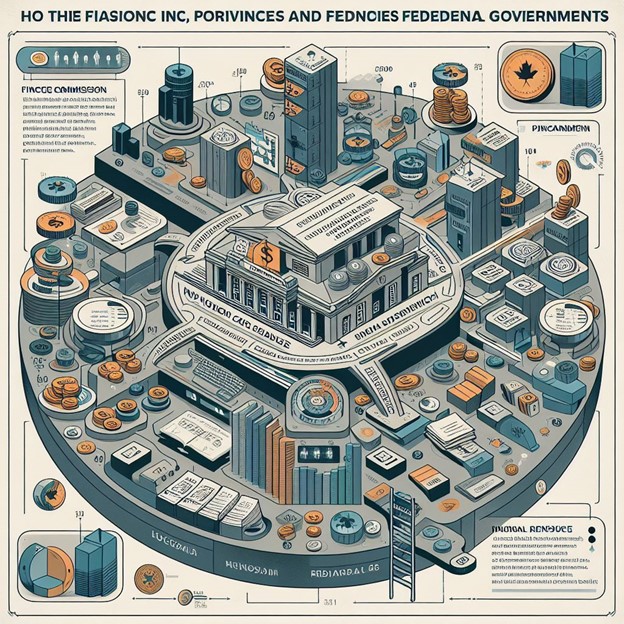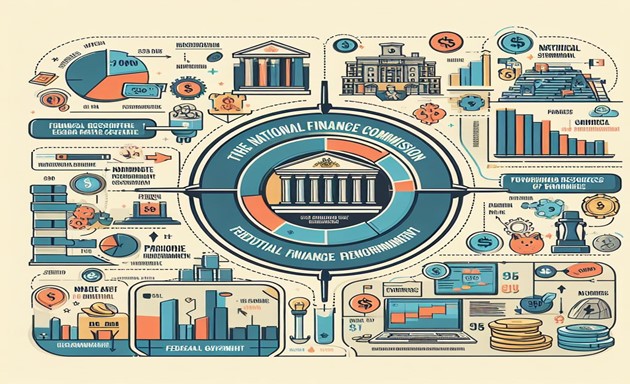What is national finance commission?
The National Finance Commission (NFC) is a vital aspect of India’s federal system, which lies at the core of this country’s fiscal federalism. Through Article 280 of the Indian Constitution, the NFC has been made, and its role is to create the spreading of financial incomes between the center and the state government. We will briefly explain the query: What is national finance commission? It is a complete and comprehensive guide in 2024.
The National Finance Commission: rather than dealing with the distribution, collection, and reliance issues in the last decade,
The National Expenditure Commission, or NFC, is at the core of India’s fiscal structure, playing the role of a medium between the Centre and the States for resource allocation and financial devolution. The NFC’s recommendations, therefore, carry a heavier weight and help in granting ease of finances, stability of the fiscal face, and keeping up with the changing development stages of various states.
The National Finance Commission: Composition and the Mandate (Mission)
The National Finance Commission is appointed by the President of India after a gap of five years. The body is generally headed up by the chairperson, who is typically a renowned economist or a former civil servant, and comprises largely of the other members, who are professionals across various fields of expertise such as public finance, economics, and administration. The NFC’s mandate, as outlined in Article 280 of the Constitution, is to make recommendations on the following:
The ways of raising the Consolidated Fund of the Indian Dollar by the government through the resources of the municipalities and panchayats within the state are in line with the Finance Commission’s recommendations.
Also, anything else given to the Commission by the President for vigilance in the interests of sound finance.
The guidelines that have been developed by the NFC act as the blueprint for the financial arrangements between the Union and the states; hence, they ensure that the states are equipped with all necessary resources to fulfill their constitutional responsibilities, fulfill their goals, and meet the welfare needs of their citizens.
The Making of the Funding Commission of the National Machine
The National Finance Commission is composed of a notification issued by the President of the country almost three years before the term of the present commission ends. This notice outlines in detail the key terms of reference for the Joint Commission on Street Vendors (NFC) that will be in effect for a certain number of years and will cover certain areas in its report.
Now, the NFC works things out. It has a complete investigation of the country’s fiscal landscape, thinking about aspects such as the ability of the states to generate income, their expenditure requirements, the influence of the central policies on the state finances, and other things connected to macroeconomics. The commission also enjoins comprehensive negotiations with the national and state characters, together with other players in the game, for the sake of collecting pertinent information and views.
The NFC’s recommendation report includes different points that require implementation, such as changes in priority setting and management policies.
Then the report of the National Commission on Finance goes to the President of India for consideration after containing all the details and thorough discussion and analysis. Lastly, these suggestions are tabled in both houses of the parliamentary and the Union cabinet and are enforced through a range of budgeting strategies. The government at the center shall enact, subject to the integrated framework’s suggestion, the NFC recommendations, which are binding on both the Union and the states.
The execution of the NFC’s suggestions for action, being the essence of the committee’s efforts, has a direct bearing on the fiscal health and economic development of the states. The central government shall be mandated to render appropriate grants and transfers of resources, as per the NFC suggestions, to the states for them to discharge all their constitutional duties and relate to variegated population demands.
The Paramount National Finance Commission’s Role in Evolving State-Central Relations
Over some time, the role of the National Finance Commission has changed, and it comes out as a mirror of the changing realities of the objective particularities and complexity of India’s fiscal federalism. Nevertheless, the main task of the NFC has changed slightly, and the commission continues its work on new issues regularly.
For example, the Finance Commission 14th (2015–2020) has brought massive changes like: 1). raising the state share of the state to 42 percent in dividing the pool of central taxes; and 2) a new vertical devolution formula that emphasizes population, area, and forest cover. The 15th Finance Commission (2020-2021), on the other hand, has a few tasks, such as aligning the finances with the economic difficulties of states and entailing fiscal consolidation.
How the NFC ensures the federal system maintains balance by providing states and unions with equal distribution of financial resources is one of the advantages of this structure. Moreover, it helps the states shed the power of dependence on the central government, as they now have enough means of autonomy and can invest in the development and services of their citizens.
The NFC makes important recommendations on grants-in-aid and fiscal transfers as well that bring the state governments of some states on the same terms and address the disparities in revenue-generating capacity and the developmental needs of the different states. It leads to equalizing the fiscal federalism of the Indian nation, i.e., poor and less developed states are given additional grants to reconcile with the states having better status concerning their development.
Conclusions about What is national finance commission?
The National Finance Commission assumes the paramount role of an institution, which determines the sharing scheme of fiscal resources between the Center and States in the Indian fiscal system. Yet, due to the implementation of its recommendations, state finances, as well as the balance in the federal structure, are restored on a wider scale.
With time passing and new problems coming to the surface, the role of the National Finance Commission will, therefore, become more and more significant, maintaining financial transfers on the principles of equity and effectiveness, creating an environment of fiscal stability, and addressing the different development policies at the states’ levels. Through its ability to evolve during change and concern for forthcoming questions, the NFC will be the one to lead the way to India’s fiscal federalism for the future. That was all about the query: What is national finance commission?

FAQs about What is national finance commission?
1. How does the National Finance Commission (NFC) function?
The Constitution offers that the top suggested body on financial materials is the National Finance Commission (NFC), under Article 280. The task at hand is to decide how fiscal resources will be mutual among the central government and the state governments.
2. Hence, how has the function of the National Finance Commission evolved?
The National Finance Commission, over its journey, has shown progress and stands for dynamic and progressive development. It is remarkable that in its 20 years of operation, KRMC has been able to respond to evolving challenges and concerns, for example, the economic effects of the COVID-19 pandemic on the state and the necessity of consolidating state resources.





0 Comments